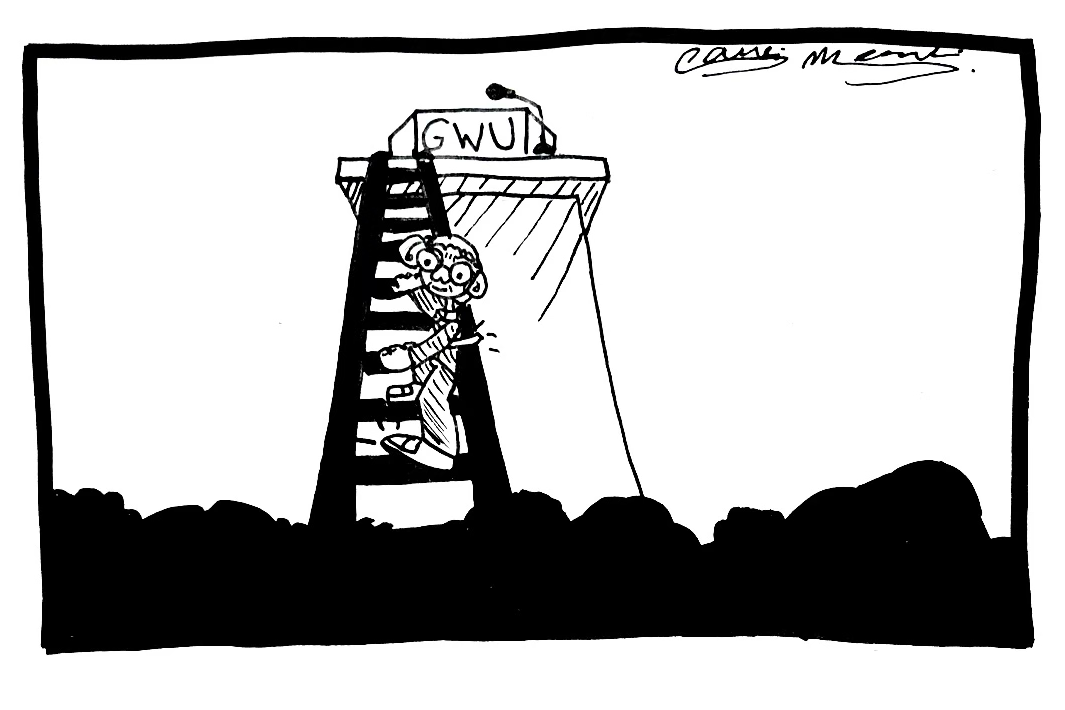If you ask a group of college students if they played sports in high school, more people will raise their hands than not. But if you ask who is still playing in college, the hands will drop like flies. Students often stop playing sports in college because they’re unwilling to commit more time than they did in high school or think they’re not skilled enough to make the team, especially since GW Athletics is Division 1 and most of those players are recruited. But club sports can be a great alternative for students who fall in either of those categories.
[gwh_image id=”1036807″ credit=”Cartoon by Grace Lee” align=”right” size=”embedded-img”][/gwh_image]
Club sports, which are registered student-run organizations, give students an opportunity to keep active and meet new people while allowing them to keep competitively playing a sport they love. More students should take advantage of the opportunity to play club sports in college and not be overly concerned with the time commitment.
Club sports are different than the varsity level because practices are usually not everyday, competitions are less frequent and missing practices or games is more acceptable. But club is still a step above the intensity of intramural sports, where team members can just show up on game day. Although some club sports have try outs, most rarely make cuts. This is especially great for students who want to try a new sport in college. GW offers seven club sports for women, nine for men and 17 that are co-ed.
From my experience playing club basketball since the beginning of freshman year, I’ve found that club sports can be even more enjoyable than varsity athletics at the high school and collegiate levels. They are more relaxed, allowing students to have fun and even goof off a bit at practice, while retaining competitiveness during games, matches or meets. Everyone playing at the club level is there because they love the sport. The lead scorer at your weekend tournament isn’t going to get their name in the paper, and the rest of the University isn’t going to know who they are. The obnoxious showmanship I observed on my high school team – where players tried to be the star – hasn’t been present on my club team. The lack of attention paid to club sports may disappoint some students who are used to larger crowds and accolades, but it actually benefits the team by facilitating teamwork and allowing for more fun.
Staying active is another important reason to play a club sport. Gaining the famous freshman 15 is a real possibility at GW. No one is going to push you to go to the gym or practice. Joining a club sport allows your teammates to hold you accountable for not showing up. Even on days when you’re stressed about a big test or paper and really don’t want to go to practice, going will make you feel better. Being active relieves stress and allows you to be more productive, according to a study by the Anxiety and Depression Association of America.
When I finished my senior year of basketball in high school, I was annoyed with some of my teammates, who had made it their goal to pad their stats and didn’t care if we won or lost, as well as a coach who turned a blind eye to this. But soon, my inner declarations that I was never playing basketball again faded away as I saw the club basketball table at the fall student organization fair. Although I decided that I wanted to try new things in college, I quickly realized that didn’t mean I had to give up what I’d enjoyed in the past. I explored different student organizations but also found myself on a familiar-looking court at basketball tryouts.
Playing a club sport won’t take over your schedule like some students may think. For club basketball, there is practice twice a week and tournaments every two-to-three weekends. The furthest I have traveled for the team last year was to Baltimore. Because club teams are student-run, much of the commitment level and travel distance depends on the specific team, so students should talk to a current team member to see what type of commitment is required. In my experience, missing practice and games is discouraged, but acceptable if you have a good excuse ahead of time. Players also feel welcome to take a semester off if they study abroad or get a time-consuming internship.
Not playing on the varsity team in college doesn’t mean high school athletes should hang up their sports equipment for good. Playing club basketball has allowed me to have fun, stay active and relieve some stress after a long day of classes. In college, there are many opportunities to stay active in the sport you love or to try a new one. You may regret not continuing to play sports in college when the opportunities to join team sports are few and far between after graduation. So grab your racket, glove or foil, lace up your sneakers or cleats and enjoy the struggles and joys of sports before the opportunity passes you by.
Kelly Skinner, a sophomore majoring in political science, is a Hatchet opinions writer.
Want to respond to this piece? Submit a letter to the editor.



